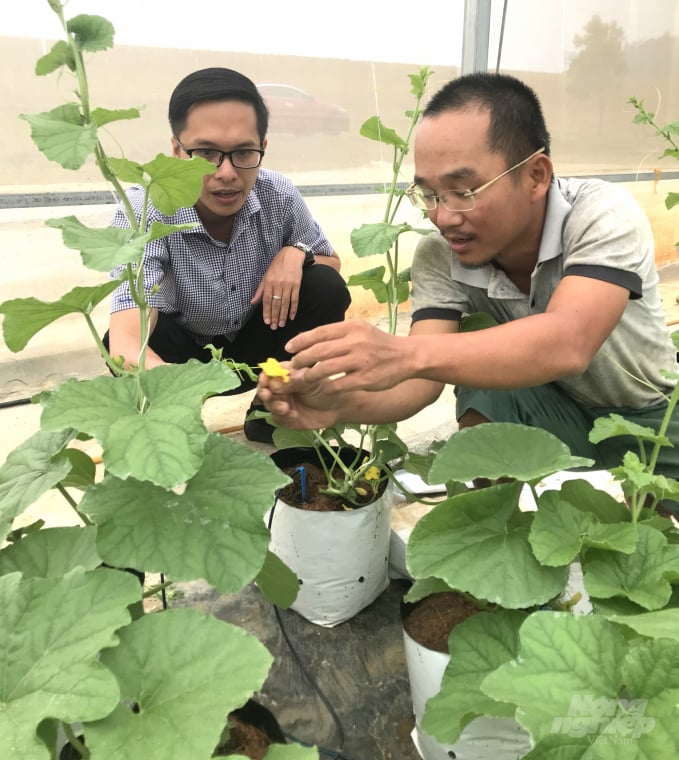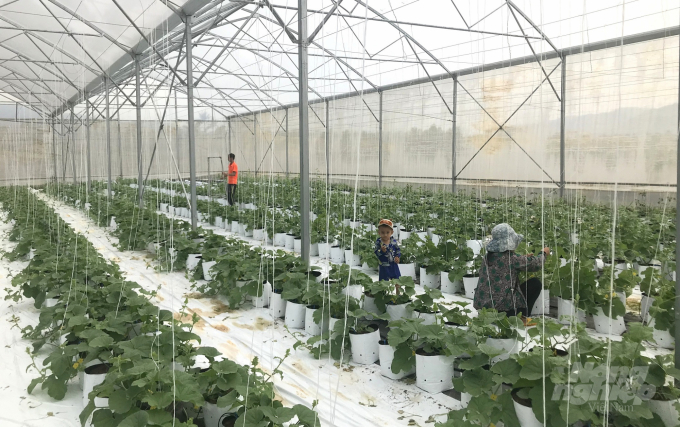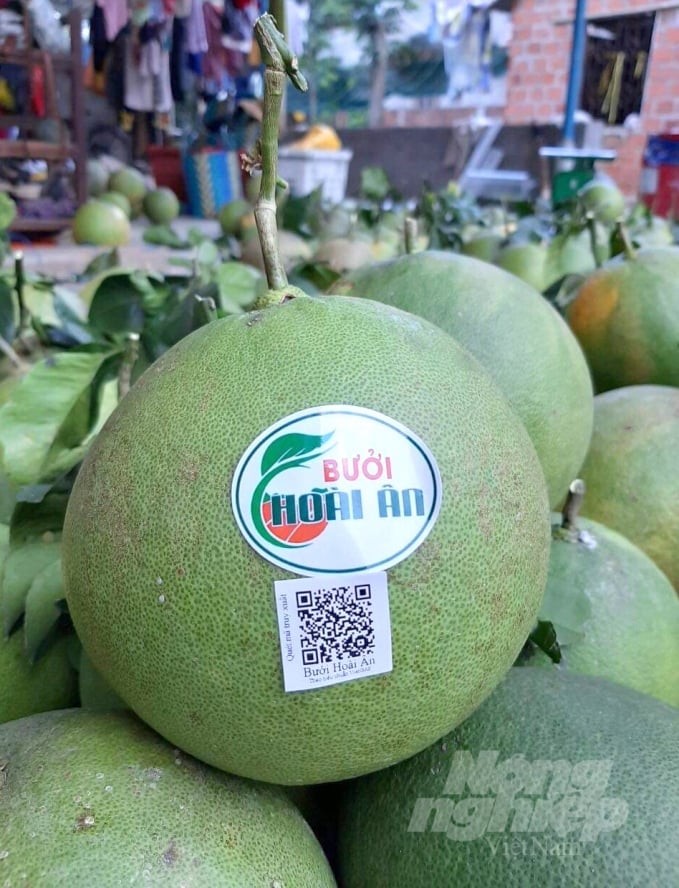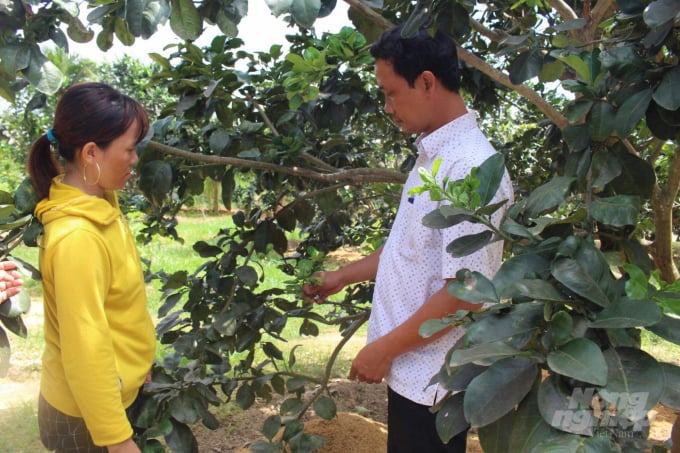May 25, 2025 | 18:44 GMT +7
May 25, 2025 | 18:44 GMT +7
Hotline: 0913.378.918
May 25, 2025 | 18:44 GMT +7
Hotline: 0913.378.918
Owning a 2,000 m2 greenhouse growing melons, cucumbers, tomatoes and many kinds of spices, Mr. Tran Bao Diep (born 1988) in Tang Bat Ho town (Hoai An district, Binh Dinh) does not have to lift a finger when it comes to plant care because most of the stages are controlled and managed using technology.

Mr. Tran Bao Diep (right) is one of the pioneers in Binh Dinh who get excited with the thought of digital transformation in agroproduction. Photo: Vu Dinh Thung.
According to Mr. Diep, during the production process, from the notation into the farmer logbook to the stage of watering combined with fertilizing as well as managing crops, all can be done on a smartphone or computer.
Coming to this realization, Mr. Diep and his colleagues immersed in research wrote the processing software, then installed and used it themselves.
“Technology has helped me capture each stage of the plant's development. It notifies me of how many centimeters the seed has sprouted on the first day. In the following days, the phone will update the height of the growing seedling, how many real leaves it now has, and how big its trunk is. All of the above parameters are recorded in the logbook. When needed I just have to type the category and it will appear on the phone for me to monitor," said Mr. Diep.
Mr. Diep claimed that temperature and pest sensors are an immense aid to garden owners. For example, a gardener sets the temperature in the greenhouse to 30oC - an appropriate temperature for plants to grow. When the sun is hot making the temperature in the greenhouse rise above 30oC, the temperature sensor will instantly, transmitting commands to the processor. The processor will turn on the misting system or the fan system automatically to reduce the temperature in the greenhouse back to the required threshold.

The pest and disease sensors will detect and update to the phone the location of the diseased plant so that the garden owner can promptly come up with countermeasures. Photo: Vu Dinh Thung.
Pest and disease sensors are default to a number of signs of common plant diseases. When the plant is infected the sensor will immediately notify the phone so that the garden owner can promptly come up with countermeasures.
“For example, I currently grow 16 rows of melons, ie 32 single rows in my greenhouse. After detecting anthracnose from a plant by recognizing its signs, the sensor will notify the processor. Then the processor will immediately notify my phone of the specific location of the diseased crop. All I have to do is to go there and take care of the diseased plants," said Mr. Diep.
The drip irrigation system also works through a central control unit consisting of a filter and a fertilizer system. Each type of fertilizer needed by the plants is prepared according to each type in tank A and tank B. When the watering time comes the irrigation system will turn on automatically. Each type of fertilizer in each tank will flow through the mother tank depending on the dose that has been defaulted by the system.
Mr. Diep can reduce the daily work of mixing fertilizer for irrigation while the plants still receive an equal amount of water and fertilizer, resulting in a balanced growth rate.

Tagged with a QR code, the "Hoai An Pomelo" product is trusted by consumers and sells at a high price. Photo: Vu Dinh Thung.
“Applying technology to production is less time-consuming and labor-intensive. Now I can be away from home for a whole month but still can monitor and take care of the plants remotely. The effectiveness is even more evident since I’m a melon grower. The orchard giving uniform fruit means that the product can be sold at a high price," said Mr. Diep.
In the past, when hearing about "digital transformation" in agroproduction, almost every farmer felt dumbfounded as if they were hearing the story of "man going to the moon". But in recent years Binh Dinh farmers have increasingly applied technology into production, having their own "beginner steps” on the path of digital transformation. It was the pioneers who contributed to the founding of a database in response to new production needs and trends. Their efforts were marked as an important stepping stone in the digital transformation process of Binh Dinh's agriculture industry.

Many farmers in Binh Dinh now feel excited when talking about digital transformation in agroproduction. Photo: Vu Dinh Thung.
Now, coming to Hoai An - the fruit storehouse of Binh Dinh, one can see that "digital transformation" has appeared on each and every crop product. Using a smartphone to have a quick scan for the QR code tagged on the green-skinned pomelo label “Hoai An Pomelo”, consumers will immediately know the place of origin, the care process and the product quality.
“Thanks to the QR code, green-skinned pomelo in Hoai An can now be sold to the market for VND 40,000-50,000/kg. With just one pomelo tree farmers can earn more than VND 1 million. The value of pomelos before compared to the current pomelos with QR codes is a huge difference. Growers’ income has improved vastly," said Mr. Nguyen Thanh Vuong, Director of Hoai An Agricultural Service Center.

Officers from Hoai An Agricultural Service Center giving guidance about the issuance of QR codes to green-skinned pomelo growers in the area. Photo: Vu Dinh Thung.
“According to the district's key agro-products development plan for the 2021 - 2025 period, in addition to green skin pomelo, we continue to guide the locals and issue QR codes for traceability for Siamese coconut, tangerine, Go Loi tea, black pepper, and Thai jackfruit. QR code is one of the factors for transparency of origin. The better the transparency, the higher the consumer's trust, from which the product’s value is enhanced," said Mr. Vuong.
Translated by Samuel Pham
/2025/05/25/4127-3-073637_820.jpg)
(VAN) Thanks to the promotion from an FAO-implemented project, vegetable production in greenhouses in Moc Chau has seen strong development, from 1.5 hectares in 2021 to nearly 50 hectares in 2024.

(VAN) FAO has recently supported USD 140,000 to implement the project 'Risk mitigation human-animal interface risks through disease control initiatives in pig farming.'

(VAN) The People's Committee of Tra Vinh province has approved an adjustment to the investment policy for the Green Hydrogen Plant project, increasing its area to approximately 52.76 hectares.
![Reducing emissions from rice fields: [2] Farmers’ commitment to the soil](https://t.ex-cdn.com/nongnghiepmoitruong.vn/608w/files/news/2025/05/05/dsc08881jpg-nongnghiep-140632.jpg)
(VAN) Clean rice cultivation model in Thuong Tan commune, Bac Tan Uyen district, is assisting local residents in achieving sustainable agriculture by substantially reducing costs, increasing productivity, and protecting the environment.

(VAN) At the conference to disseminate Resolution No. 68, AgriS introduced its digital agricultural ecosystem and reaffirmed its commitment to accompanying the Government in promoting private sector development and sustainable agriculture.

(VAN) 'Blue Ocean - Blue Foods' initiative is designed to restore marine ecosystems and establish sustainable livelihoods for local communities by cultivating a minimum of 1,000 hectares of cottonii seaweed in the first three years.
/2025/05/21/4642-3-112707_603.jpg)
(VAN) The V-SCOPE project has made direct contributions to three out of six pillars of the Comprehensive Strategic Partnership between Vietnam and Australia.